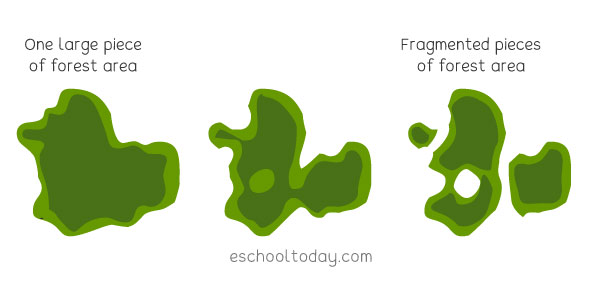- Forest Preservation
Forest degradation and fragmentation
Forest degradation is different from deforestation. Degradation is the destruction or reduction in the quality of specific aspects of forests. Prolonged degradation can wipe out a forest. Degradation can result in a decrease in tree cover, changes in their structure, or a reduction in the number of species that can be found there. If acid rain destroys trees in a vast area, it can be called forest degradation.
Forest degradation is the changes within the forest which negatively affect the structure or function of the stand or site, and thereby lower the capacity to supply products and/or services. FAO (2001) – Global Forest Resources Assessment 2000
Forest degradation can be caused by factors such as
Forest fires:
In many forests, such as in boreal and dry tropical forests, fires are usually expected from time to time. Fires may be caused by humans, accidents, or natural factors. Forest fires wipe out many thousands of acres each year all over the world. This has effects on biodiversity and the economy as well.
Climate Change:
Extreme climates can also cause degradation. Prolonged droughts and dry conditions reduce the tree cover and dry out water bodies running through them. They force many animals to migrate and reduce the quality of forests ecosystems.
Pests and diseases:
Pest or disease outbreak can also destroy the vegetative cover in forest lands.
Degraded forests can often be restored. The Global Partnership on Forest Landscape Restoration (GPFLR, undated) suggested that more than one billion hectares of deforested and degraded forest land worldwide are suitable and available for restoration.
What is forest fragmentation?

Degradation can also result in forest fragmentation, and fragmentation can also result in degradation. This is when a large forest ends up divided into many smaller patches. It is particularly not healthy for larger forest animals, as they thrive well in large areas rather than pieces of forests.
